Having a strong password is imperative in a world where you need an online account for almost everything. That’s where you need tools like password managers to relieve you of the burden.
In ancient times, passwords served as secret codes for conveying important messages. Later, they also experienced advancements in their form with time, thanks to technology.
Nonetheless, the purpose of passwords remains the same – protection of important information. That’s why the digital world is overwhelmed with the use of passwords.
From email accounts to social media platforms and online banking accounts, every platform requires you to create an account and sign in using your password.
It’s like a key to unlock every door in the realm of the digital world.
So how do you manage all your keys in real life? Perhaps, with a key bunch or numerous key bunches, you further organize on a key bunch holder. Isn’t it?
Doing so helps in accessing the right key(s) quickly when needed and protects the keys from accidental losses.
In the same way, you need a password manager to protect and manage your passwords.
Top 5 password managers – Quick list
- Keeper – An inclusive password manager supporting unlimited devices, biometric MFA logins, and a private messaging app.
- DashLane – A freemium password manager with tremendous device compatibility, enterprise security features on specified plans, and dark web monitoring.
- LastPass – A user-friendly password management tool for both mobile and desktop users. It comes with affordable pricing plans and offers 30-day free trial.
- 1Password – A dedicated password management and security tool that also wipes your device clipboard to prevent credential thefts.
- NordPass – A freemium tool from the popular VPN service provider NordVPN, offering diversified cross-platform compatibility and affordable pricing plans.
Wondering which one to use? Before deciding about it, read on to understand these tools and how they work. Then, you’ll also find a list of the 13 best password managers that you can use today.
What is a password manager?
As the term implies, a Password Manager is dedicated software that helps store your passwords safely. These tools save all your passwords for all accounts, including social media accounts, email accounts, or banks.

Password Managers safely store all the passwords in an encrypted form.
You need to enter a master password to sign in to your password manager to access stored passwords.
It means that with a single password, you save yourself from the burden of remembering numerous passwords. That ultimately gives you the luxury of never reusing passwords.
Today, most password managers come with additional features. For instance, they help in creating strong passwords.
Besides, they also auto-fill login forms where you need to enter passwords, saving you from the hassle of remembering and typing passwords.
Types of password managers
Depending on how they store and manage passwords, password managers are classified into three types. These include,
- Desktop-based password managers
- Cloud-based password managers
- Single Sign-On (SSO) password managers
Let’s delve into the details of these three types.
Desktop-based password managers
These password managers save all your passwords on the local drive of your device, be it a PC, laptop, smartphone, or any other. Nonetheless, what’s different is that the password manager stores all this data in an encrypted form.
The key benefit of desktop-based password managers is that your passwords remain private to you only.
Of course, that’s the case with other types too. But here, the storage is solely relied on your local device and not on any other device or network.
While that’s a benefit, the same reason is its downside too. It’s because if you lose access to your device, you lose access to all your passwords. So, you might want to sync your vaults to multiple devices, something that conflicts with the sole purpose of desktop-based storage.
Cloud-based password managers
These password managers save all the passwords in an encrypted form to its cloud network. In this way, your passwords remain safe with the service provider that willingly shares the burden of password security.
A key benefit of cloud-based password managers is ready accessibility. Regardless of whichever device you use and wherever you are, you can sign in to your password manager to access your passwords.
However, the only limitation with this type is that you essentially need an internet connection to access your vault. Though, once you connect online, you can then access your vault via the password manager’s browser add-on or desktop/mobile app.
Single Sign-On (SSO) password managers
As the name shows, SSO Password Managers let you sign in to all your accounts with a single password.
They work differently from the above two types of password managers in that you don’t have to manage a password vault. Nor do SSO Password Managers fill up the respective password for every account.
Rather, all they provide you with is just one password that you subsequently use to sign in to all apps.
This feature makes SSO password managers popular among the business community. It’s because SSO facilitates the employees to access various apps as and when needed, without requiring multiple passwords.
Moreover, SSO password managers also help the organizations’ IT personnel by eliminating the hassle of managing password security, resetting, and troubleshooting.
How a password manager works
To understand how a password manager works, think of it as a vault.
You need a key to unlock the vault that stores your valuables, including some keys to sensitive locations.
But you don’t have to worry about all those keys since your vault protects them when locked. And, only you can unlock that vault since only you have its key.
Similarly, a password manager keeps all your passwords secure, making them accessible to you only. For security, the password manager applies the AES-256 industry-standard encryption algorithm. That helps keep all prying eyes at bay.
Whereas, on your part, you need a ‘Master Password’ to access the password manager.
In the background, while the password manager does manage and store your passwords, it never knows anything.
Precisely, most password managers work on a ‘zero-knowledge’ basis in that the service provider never directly stores anything to its own servers. Hence, even if the service provider suffers a breach, it won’t impact your passwords.
Why use a password manager
Perhaps, you might think of password managers as an unnecessary luxury or a technological burden, especially if you’re good at remembering things.

However, password managers aren’t a luxury, but a necessity. It’s because they do not serve as a mere treasure vault for passwords. Rather they have many more features that make it a requisite for all users – including you!
At first, password managers ease your stress by saving everything else for you, leaving you with only a master password to remember.
Then, password managers help you with the generation of secure passwords.
Today, when brute force is common and password breaches have become a norm, you cannot stay relaxed by setting up a petty password like ‘123456.’
Hence, with a password manager, you can set up strong passwords with alphanumeric-symbolic combinations in some random gibberish without having to remember those meaningless phrases.
Moreover, most password managers provide family packages to help you share your sensitive account credentials with family when needed.
Besides, using these tools keeps you updated whenever any of your passwords get hacked.
Whether your credentials suffer a direct breach or an indirect hacking attack, your password manager will let you know of the site that suffered the breach and your affected password. Hence, you can change your password right away to avoid any potential attacks.
In short, once you use a password manager, you will realize how important it is for your online survival.
13 best password managers recommended for you
Now that you know how these tools help you let’s see which password managers you should use.
Here, we have reviewed the top secure password managers that will surely keep your data safe to make things quick.
1. Keeper
The first in our selection of the best password managers is Keeper. Indeed, this password manager offers all the great features needed for ensuring robust cybersecurity.

- Device compatibility: Windows, Mac, Linux, iOS, and Android
- Browser compatibility: Google Chrome, Mozilla Firefox, Microsoft Edge, Internet Explorer, Apple Safari, and Opera
- Subscription model: Paid (30-day free trial for personal use; 14-day free trial for business)
- Pricing plans: Individual user: $2.49/month. Family: $4.99/month. Also offers discounted plans for students and special packages for businesses and enterprises.
The company behind this tool not only invests in password security. Instead, they also ensure an overall secure experience for the users by offering private chat messenger.
With the password manager, users can avail of unlimited password storage, unlimited devices, limitless identity and payments, secure sharing, emergency access, and 24/7 customer support. In contrast, the tool offers a secure login via Fingerprint and Face ID.
Users can also get the private messaging app with the bundle offer to secure their chats. This tool offers unlimited message retractions and self-destructing messages, secure logins, private media galleries, and 20GB of storage.
All these incredible features are available for small fees.
Moreover, the Keeper also offers dark web monitoring for breach alerts. However, this feature is available as a separate paid offer.
The only downside with this tool is that Keeper does have a limited free version, even for individual users. However, new users can assess its suitability comprehensively by availing 30-day free trial.
Pros:
- Numerous security products in addition to the password manager
- Robust security while sharing passwords
- Biometric authentication for secure login
- 24/7 customer support
Cons:
- Lacks automatic password updates
- No free version
2. DashLane
The second in our list of best password managers is DashLane. It tops the best lists online because of its amazing features and ease of use for every user with any device.
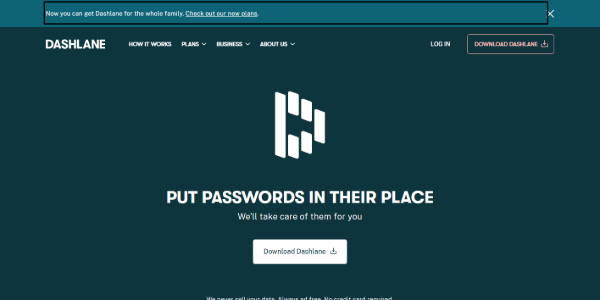
- Device compatibility: Windows, macOS, Android, iOS. Supports Linux and Chromebooks via browser extensions, too.
- Browser compatibility: Google Chrome, Mozilla Firefox, Apple Safari, Microsoft Edge, Internet Explorer
- Subscription model: Freemium
- Pricing plans: Individual users: $4.99 to $9.99 per month. Family: $7.49 to $14.99 per month.
DashLane password manager comes in a freemium version offering great features with both free and paid versions.
The password manager offers storage of up to 50 passwords on a single device with free plans.
Apart from the basic features like auto-fill forms and password storage, it also offers secure two-factor authentication login and customized security notifications. You also get secure sharing for five accounts with the free version.
Whereas, if you choose the paid plans, you get unlimited password storage for unlimited devices along with VPN and dark web monitoring.
It also offers credit monitoring and identity restoration to the premium plus customers.
Apart from the basic subscriptions for general users, DashLane offers special packages for enterprise clients. Business owners can also test the feasibility of this password manager for them with a free trial.
Pros:
- Supports all major desktop and mobile devices
- Offers all basic features with the free version
- Offers advanced security features like dark web scanning and VPN
Cons:
- Costly pricing plans
3. LastPass
If you ask which password manager is easiest to use, then LastPass is the answer. It works as good as DashLane and offers great features for the users.
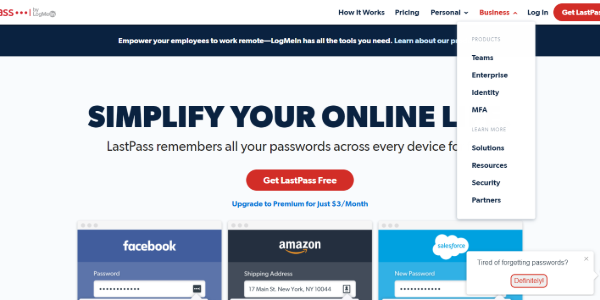
- Device compatibility: Windows, macOS, Linux, iOS, Android
- Browser compatibility: Google Chrome, Mozilla Firefox, Apple Safari, Opera, Microsoft Edge, Internet Explorer
- Subscription model: Freemium
- Pricing plans: Individual: $3/month. Family: $4/month
Precisely, the LastPass password manager is one of the best free password managers. It supports multiple devices, one-to-one sharing, secure password generation, and auto-fill. With its free version, you also get multi-factor authentication and LastPass Authenticator.
Whereas, if you decide to pay a few bucks, you can get advanced features. Those include emergency access, priority tech support, and 1GB of encrypted file storage.
If you aren’t sure about choosing the premium plans, you can also opt for the 30-day free trial.
Also, enterprise clients can choose from various business plans offered for as low as $3/user/month with a 14-day free trial.
Pros:
- Remarkable features within the free version
- Compatible with all major devices and browsers
- Secure password sharing
Cons:
- History of breaches and bugs
4. 1Password
If you’re looking for the best password manager for your iPhone, then 1Password is the solution.
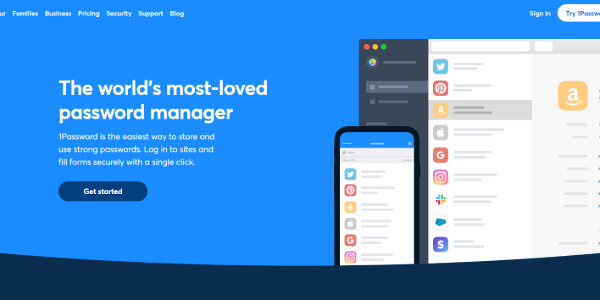
- Device compatibility: Windows, Mac, iOS, Android, Linux, and Chrome OS
- Browser compatibility: Google Chrome, Mozilla Firefox, Microsoft Edge, and Brave browser
- Subscription model: Paid only (30-day free trial)
- Pricing plans: Individual: $2.99/month. Families: $4.99/month.
Like all other high-end password managers, 1Password also offers remarkable features for its users. These include secure AES 256-bit encryption, protection from security breaches, alerts in case of breaches, brute force protection.
Also, it keeps the users’ device clipboard clean by frequently wiping the details. Hence, it saves the users from accidental hacks if a perpetrator gains access to the device clipboard. It is a handy feature for iOS users.
Moreover, it offers some other advanced features, such as protection against keylogging.
With the free version, users can avail themselves of all the basic features they need. For instance, unlimited password storage, 1GB of secure file storage, restoring deleted passwords, 24/7 customer support, and two-factor authentication.
Whereas premium users can avail themselves of even more features with very affordable pricing plans.
Pros:
- Supports for all major OS and browsers
- Top-notch security with privacy
- Best plans for families
Cons:
- No free version
5. NordPass
Another great free password manager for you to pick is NordPass.
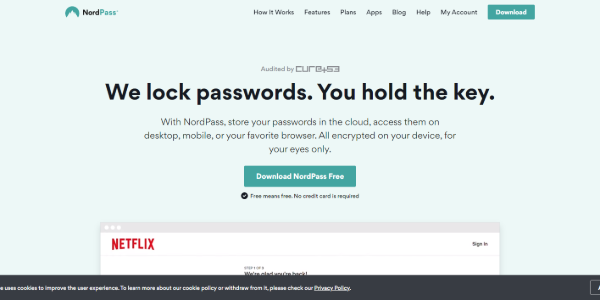
- Device compatibility: Windows, Mac, iOS, Android, Linux
- Browser compatibility: Google Chrome, Mozilla Firefox, Microsoft Edge, and Opera
- Subscription model: Freemium
- Pricing plans: Individual: $2.49 per month. 10% discount for Students.
Like all its rivals, it offers great features to the free users, including unlimited password storage, secure storage of sensitive data, and sync across multiple devices.
Though, you can only use the app on one device at a time.
Whereas, if you choose to pay, you can also avail yourself of more features, including active connections on six devices, secure sharing, and trusted contacts.
What’s great with this password manager is its affordable pricing plan. Plus, it also offers special discounts to students who are critical of their online security.
However, we couldn’t find any dedicated family plans with NordPass.
Pros:
- Affordable pricing plans
- Secure password sharing
- Top features with a free version
Cons:
- Lacks auto-fill forms feature
6. RoboForm
RoboForm is another excellent tool for saving your passwords securely. It offers terrific support for all major platforms to let the users use this tool on any device of their choice.
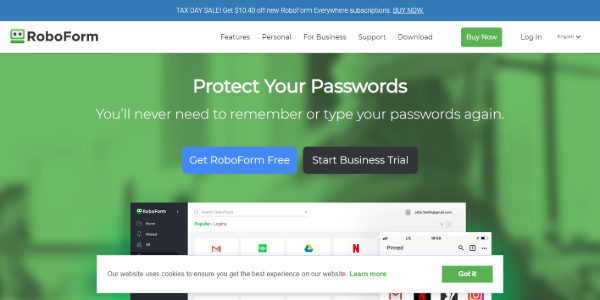
- Device compatibility: Windows, Mac, iOS, Android. Also supports Linux and ChromeOS via a browser extension.
- Browser compatibility: Google Chrome, Mozilla Firefox, Microsoft Edge, Internet Explorer, Apple Safari and Opera
- Subscription model: Freemium
- Pricing plans: Individual: $1.99/month. Family: $3.98/month
RoboForm comes in a freemium model, offering the users the liberty to pay for their services.
The tool offers all desirable features such as unlimited logins, auto-fill forms, and robust encryption with the free version. You also get secure logins sharing, app logins, and bookmark management.
Whereas, if the users choose to pay, they can avail premium security features such as 2FA, secure folder sharing, cloud backup, web access, and priority customer support.
This one is different from its high-end rivals because RoboForm does not offer device sync in its free version. Nonetheless, users can easily opt for this paid feature owing to their cheap pricing plans.
Pros:
- Compatible with multiple OS and browsers
- Robust encryption protocol
- Comprehensive auto-fill form feature
- Handles app logins
Cons:
- No device sync on the free version
7. Bitwarden
For everyone looking for the best free password manager in the market, Bitwarden is the choice.
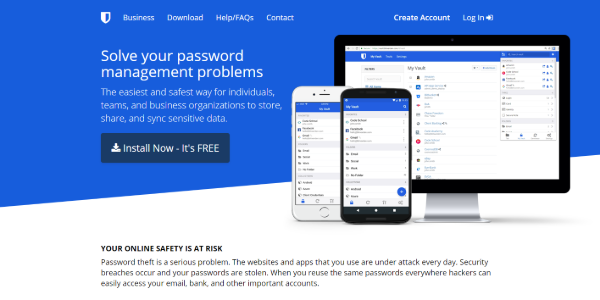
- Device compatibility: Windows, macOS, Linux, iOS, Android
- Browser compatibility: Google Chrome, Mozilla Firefox, Microsoft Edge, Apple Safari, Opera, Brave, Vivaldi, and Tor Browser
- Subscription model: Freemium
- Pricing plans: Personal use: $10/year. Family: $1/month. Separate plans for businesses and enterprises
The most attractive feature of this password manager is that it is open-source. Hence, you can trust the level of privacy and security they offer considering this transparency.
Besides, their free version is the most impressive among all the best password managers. They provide free users with every needed security measure, including sync across multiple devices, unlimited password storage, storage for notes and identities, 2FA login, and a secure password generator.
Also, users are offered an optional feature of self-hosting their own servers.
Whereas, with the premium version, their features reach a premium level. They offer secure login with Yubikey, U2F, and Duo, 1GB of encrypted data storage, and priority customer support.
Another attractive thing about Bitwarden is that its pricing plans are also one of the cheapest among all its rivals.
Pros:
- Compatible with major OS and browsers
- Cheap pricing plans
- Open-source
Cons:
- No automatic password strengthening
8. KeePassXC
If you’re looking for an offline password manager, KeePass is what you need.
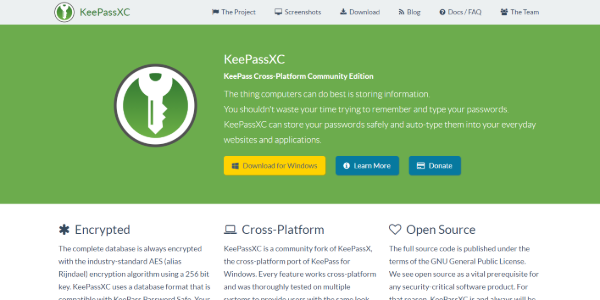
- Device compatibility: Windows, macOS, Linux. Also support Chromebooks, Blackberry, Android, iOS and other platforms via contributed/unofficial builds
- Browser compatibility: Numerous web browsers though contributed/unofficial password manager apps
- Subscription mode: Free
- Pricing plans: N/A
This password manager is another open-source project, which means it’s much more secure than you can imagine.
Also, it’s free to use for everyone; no hidden charges or premium plans for advanced packages. Hence, its features are similarly and equally available to all the customers.
Noteworthy functionalities of this tool include Advanced Encryption Standard (AES, Rijndael) and the Twofish algorithms for encrypting password databases, SHA-256 for encrypting master keys, protection against keylogging, multi-language support, auto-type, sorting of passwords in groups, and a lot more.
Besides, this tool also offers portable apps. It means you can carry this with you on a USB stick to run on Windows systems without installation.
The only downside with this tool is its unimpressive design (for UI/UX fans).
Also, it’s not so easy to use the first time. But once you get used to it, you’ll fall in love with the security it offers.
The native KeePass apps support Windows, macOS, and Linux only.
However, it does offer support for numerous other platforms, web browsers, and smart devices via contributed/unofficial variants. One of these is KeePassXC.org – an advanced variant aimed at UI lovers as it exhibits great designs.
Pros:
- Robust encryption algorithms
- Support for plenty of platforms and web browsers
- Superior security features
Cons:
- Difficult to use for some users
9. Sticky Password
Sticky Password is another excellent addition to the list of best password managers. The first thing we liked about it was its attractive website design.
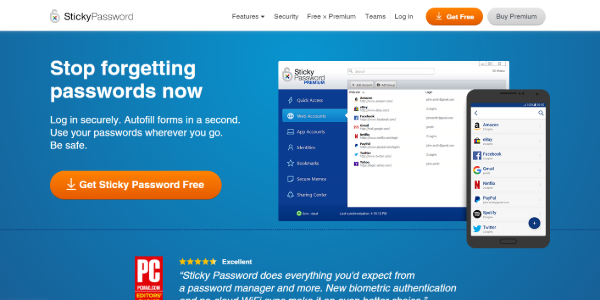
- Device compatibility: Windows, macOS, Android, and iOS
- Browser compatibility: Google Chrome, Mozilla Firefox, Microsoft Edge, Internet Explorer, Apple Safari. Also support Opera, Chromium, Comodo Dragon, Yandex, Seamonkey, Pale Moon in 32-bit version only.
- Subscription model: Freemium
- Pricing plans: $29.99/year
Besides design, the functionalities of this tool are also impressive. Moreover, it comes in a freemium model, offering great features with the free version.
These include unlimited password storage, secure digital wallet, auto-fill forms, robust password generator, 2FA, biometric authentication, and a USB portable version for Windows.
Whereas, if you choose to pay for it, you can also avail sync across multiple devices, secure password sharing, and cloud backup.
Pros:
- Compatible with numerous OS and web browsers
- Generates strong passwords
- Auto-fill web forms
Cons:
- No device sync with the free version
10. Zoho Vault
Zoho is popular among the business community due to its project management tools. Besides these platforms, Zoho also offers a dedicated password manager for the users – the Zoho Vault.

- Device compatibility: Windows, Android, iOS
- Browser compatibility: Google Chrome, Mozilla Firefox, Microsoft Edge, Apple Safari, Brave, Vivaldi
- Subscription model: Freemium
- Pricing plans: Personal use: $0.9/user/month. Professional use: $3.6/user/month. Enterprise: $6.3/user/month
This password manager offers better control over the passwords shared within a team. In addition, this tool can integrate with third-party apps like Gmail, Microsoft 365, Dropbox, and more, for password control.
Besides, Zoho Vault also offers SSO to its enterprise users for use with cloud services such as Slack and Salesforce.
Though, you can integrate it with any app you want – thanks to its dedicated API.
The best thing about Zoho Vault is that it also offers excellent features with its free plan. Moreover, it provides a very cheap Free+ plan that simply costs less than a dollar for personal users.
Also, it offers cheap pricing plans for enterprise clients too.
Pros:
- Easy to use
- Cheap pricing plans
- Dedicated features for business use
Cons:
- No auto-fill forms features
11. Dropbox Passwords
Dropbox is the new player in the realm of password security. After achieving success in the beta version, Dropbox Passwords is now available as a standalone password management tool.
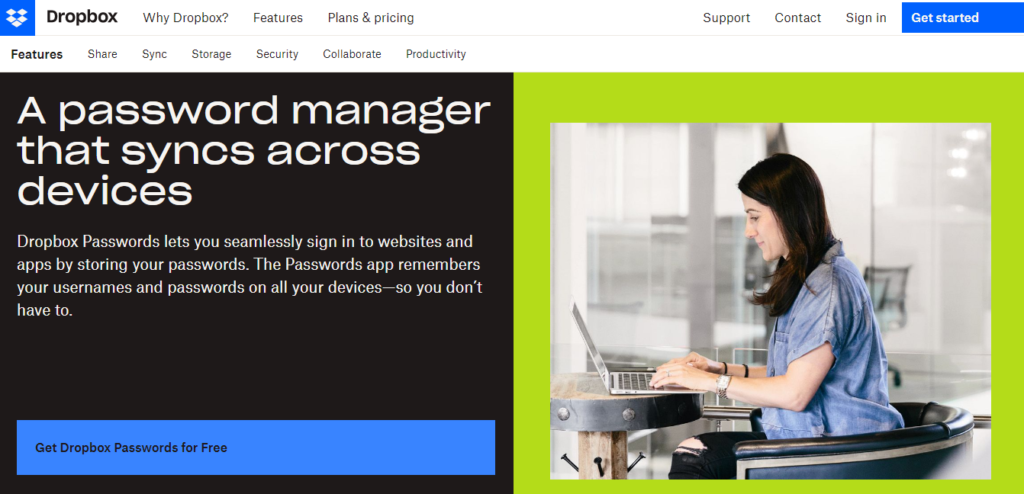
- Device compatibility: Android and iOS
- Browser compatibility: Mozilla Firefox, Google Chrome, Microsoft Edge, Apple Safari, Brave, and more.
- Subscription mode: Freemium
- Pricing plans: Individual users: $9.99/month. Family: $16.99/month. Business users: $16.58/month (individuals), $12.50/user/month to $20/user/month (for teams).
Despite being new, it managed to reach our list of the best password managers because of the potential it bears for users’ security.
Notably, Dropbox Passwords offers one-click sign-in to the users.
Its prominent features include password storage, automatic sync with multiple devices, auto-fill form, and secure password generation.
Moreover, like all other high-end password manager apps, Dropbox Passwords also employ zero-knowledge to respect your privacy.
You don’t have to make any effort to use this password manager. Instead, a simple Dropbox subscription would provide you with this utility without additional payments.
While it offers numerous extraordinary features, it currently lags behind in device compatibility. That is, you can now use its app on your mobile phone only. Nonetheless, the range of browser extensions it offers pretty much overcomes this weakness for desktop users.
Pros:
- Auto-fill form feature
- Creates strong passwords
- Sync across multiple devices
Cons:
- No desktop app
12. RememBear
RememBear password manager comes from the famous VPN developer TunnelBear. So, if you love that bearish hug for protecting your online privacy, then this tool is for you.
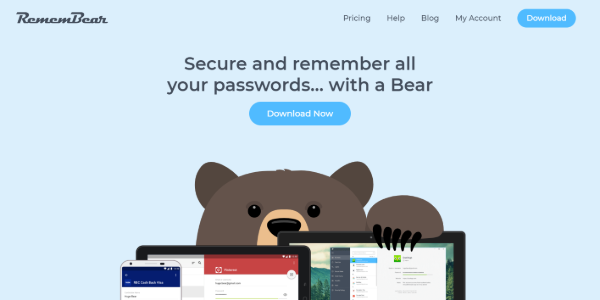
- Device compatibility: Windows, iOS, Android, and macOS
- Browser compatibility: Google Chrome, Mozilla Firefox, Apple Safari
- Subscription model: Freemium
- Pricing plans: $3 per month
RememBear may not offer out-of-the-box features like LastPass, DashLane, and others. Yet, what it provides is still suitable for those looking for a decent password manager.
The tool comes with a smooth auto-fill forms feature. It not only saves you from the burden of typing passwords but also stores other sensitive data such as credit card details.
Moreover, it offers a secure password generator, secure sync across multiple devices, robust end-to-end AES 256-bit encryption, and secure login with biometric authentication.
You can undoubtedly trust their security as it has been independently audited by Cure53.
Pros:
- Robust AES256 encryption
- Auto-fill web forms
- Supports Fingerprint and Face ID
Cons:
- No device sync with the free version
13. LogMeOnce
LogMeOnce, as the name depicts, just requires you to log in once to this password manager. It will then handle the rest on its own.
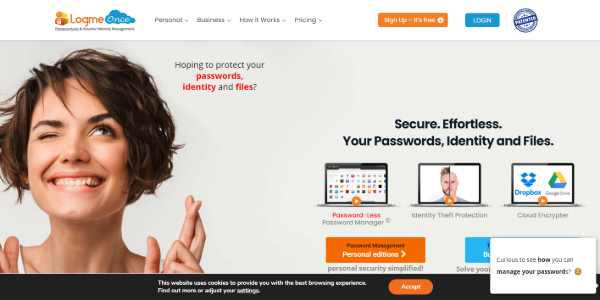
- Device compatibility: Windows, macOS, Linux, iOS, and Android
- Browser compatibility: Google Chrome, Mozilla Firefox, Internet Explorer, Apple Safari
- Subscription model: Freemium
- Pricing plans: Personal use: $2.50/month. Personal Ultimate: $3.25/month. Family plan: $4.99/month
It also made it to our list of best password managers because of its whopping 57+ excellent features and impressive pricing plans.
Even with the free version, it lets you save unlimited passwords, limitless auto-fill, and unlimited device sync.
They also offer two-factor authentication, a secure password generator, and 1MB of encrypted storage, all for free.
Whereas, by paying a couple of bucks for the premium version, you can get more features, including 1GB storage, multi-factor authentication, activity report, live password tracking, and much more.
And, of course, if you go for higher plans, the features they offer level-up even more.
On top of everything else, what makes this stand out from others is the “password-less” login. No need to remember Master Password anymore.
Pros:
- Compatible with numerous platforms
- Huge list of features
- Interactive interface
Cons:
- Too many features may be overwhelming
Benefits of using password managers
Although, like any other technology, password managers are also vulnerable to different cybersecurity issues and technical glitches.

So, are password managers worth it? We hear you ask.
The answer is ‘yes,’ they are for sure.
Whatever weaknesses they may have, they are still worth using for your own security.
If you wonder how these tools help you, here we list some significant benefits.
One password to memorize
As said above, the critical feature, and the benefit of a password manager, is that you don’t have to remember many passwords. Instead, it only takes you to remember one master password, letting your password manager store the rest.
In brief, once you get a password manager, forget the hassle of noting down your passwords on sticky notes, notepads, or other lists. Nor do you have to click on that ‘Forgot password’ button anymore.
Keep your passwords encrypted
Another benefit of password managers is that your credentials remain exposed to you only. Thanks to the robust encryption these tools employ that keeps your passwords protected.
The underlying encryption will keep your credentials unaffected even in a security incident.
Access passwords across multiple devices
Since password managers offer sync across different devices, you can access your credentials anytime. Just make sure you download the respective app on your device.
After that, whether you’re at home, at work, traveling, or enjoying vacations, and regardless of whichever device you have, just sign in to your password manager using your Master Password. And enjoy accessing any of your accounts, even Netflix, without worrying about your credentials.
Set up strong passwords quickly
Cybersecurity breaches and the use of brute force by cybercriminals keep growing. As a result, it is always likely that the password you set up for your account is known to hackers.
If not now, they will know it for sure in the future.
Thus, what’s imperative today is setting up unique and complex passwords.
Of course, you cannot think of complex combinations for tens of accounts. But your password manager can do it.
These tools generate unique and complex passwords involving random alphanumeric strings joined by special characters. Hence, neither are they easy to brute force nor can they be guessed.
Minimal to no money expenditure
While nothing worthy is usually for free, that’s not the case with password managers.
Many good password managers offer basic features for free to cater to the requirements of many users.
Yet, you can subscribe to paid versions if you want more features. Moreover, you don’t have to burden your pocket since these tools are available for very low costs.
How to choose the best password managers
How did you select those 13 passwords for me? We hear you ask.

Here we list what we considered while selecting those password managers from the plethora available in the market. You should also consider these aspects when choosing a password manager for you.
Features
Different password managers offer different features.
Yet, most of them should ideally include secure sharing of passwords, breached password alerts, two-factor authentication, auto-form filling on web forms, and file storage.
Some of these even offer VPN and dark web monitoring as well.
Security
The best password managers should offer robust security, with at least AES 256-bit encryption for passwords.
Likewise, the zero-knowledge protocol should also be there to trust that the tools respect our privacy.
Price
While preparing the list, we focused on the best free password managers and those that offer good value for money.
In other words, password managers should offer features that correspond to the amount the vendors demand from the users.
Ease of use
No matter how impressive a password manager is, it’s not worth using if an average user gets confused while using it.
The ideal tool should aim at ease of use by an average user. Hence, we prefer password managers with a user-friendly interface, clear-cut settings, and accessible options.
Customer support
Lastly, vigilant customer support is also essential in making a password manager great. Such services enable the customers to contact them whenever they get stuck at anything.
Hence, the time to respond, availability hours, ease of contact via chat or emails, and the communication languages is what everyone should look for before choosing a password manager.
Are password managers safe to use?
The answer to this question is neither a ‘yes’ nor a ‘no.’
Whether a password manager is safe to use or not depends on how you perceive security.
If by safety, you mean the improbabilities of cybersecurity incidents, then password managers aren’t safe.
Like any other technology, these tools often develop bugs and vulnerabilities that criminal hackers may exploit. Recently, researchers have shared a detailed research paper explaining how they found vulnerabilities in top password managers.
Similarly, these tools have also been a victim of direct cyberattacks.
Nonetheless, these drawbacks do not blur the importance of password managers.
As Troy Hunt once commented,
“Password managers don’t need to be perfect, they just need to be better than *not* using them.”
Indeed, the functionality and security that password managers offer are still more than what you get without these tools.
For instance, these tools create and store strong passwords for you, which you may not even think of creating and remembering.
Likewise, all the benefits listed at the beginning of this article are available only when you use a password manager. When you don’t, you deprive yourself of all the benefits besides exposing yourself to security risks.
Can I save my passwords to my browser?
Technically and practically, you can. But, ideally and logically, you shouldn’t.
Almost all good web browsers have a primary feature for users to store passwords. You can call them a password manager as they allow you to save passwords for all your accounts.
And, if you want to access your passwords across multiple devices, you can create an account on the service, such as Google or Mozilla Firefox, and download the same browser to all your devices.
However, the password managers Chrome, Firefox, and other browsers offer aren’t secure. They have limited features.
For instance, these managers do not help in generating complex secure passwords.
Moreover, they don’t offer encryption. Instead, these tools store your passwords in plain text. Hence, anyone accessing your browser may access your passwords too.
Although Mozilla Firefox offers a password encryption feature to its registered users, you will likely face difficulty syncing Firefox passwords, especially with iOS.
So, if you want your passwords to remain secure while setting yourself free from the hassle of managing passwords, go for dedicated password managers apps.
Best practices for password safety
Choose password managers wisely
Ever wondered why password managers are free in general when some of them offer paid services?
Well, the difference lies in the number of features these tools offer.
As explained earlier, while some top-notch password managers offer freemium plans, they too provide limited features with free versions.
Naturally, when the vendors offer premium services, they will have to charge their customers to keep things rolling. Such features may include sync across devices, multi-factor authentication, shared logins, etc.
With free versions, you miss availing of all those essential features.
Whereas, if you choose any average password manager available completely free, you should ideally refrain from using it.
When the vendors aren’t charging you for the service, they are likely to exploit you as their product to make money.
Create long complex passwords
For creating passwords, make sure to generate complex ones that are difficult to guess by a human or a robot. The more difficult it is to crack, the securer your account remains.
As the best practice, users should use a combination of alphanumeric gibberish with special characters. Besides, the passwords should be long enough (at least 8 to 10 characters) to make brute-forcing difficult.
You should ideally use passphrases – long phrases comprising of multiple words. Also, you can make them even more complex by adding numbers and special characters to them.
If you use a password manager, you don’t have to worry about it since your manager will do it.
Never reuse a password
Whether you use a password manager or not, NEVER REUSE YOUR PASSWORD.
It’s because, in case of a breach of one account, you eventually risk your other accounts too, where you have used the same passwords.
Disable auto-fill web forms
Although, auto-fill web forms is an excellent option as it saves you from the hassle of typing passwords.
However, if you’re concerned about security, you should ideally disable this feature because it makes password managers vulnerable to cyber attacks.
Setup 2FA or MFA
Setting up two-factor authentication (2FA) or multi-factor authentication (MFA) is a robust means to secure your account.
Enabling this feature adds one or more additional security checks on account logins. For example, you get a code or a PIN on your mobile number or email, or both, or you have to go for biometric scans. Unless the user passes all these steps, they won’t be able to log in.
In brief, this additional security check takes the other means in your possession in the loop. Thus, in case of any password breach, the adversary won’t be able to sign in to your accounts.
Moreover, due to the prompts you receive for further authentication, you will get to know if somebody attempts signing in to your accounts.
Develop a password management policy for your firm
It becomes difficult to train all the employees at an organizational level for cybersecurity best practices. Furthermore, even if you train them well, you can never be sure how aptly your staff implements the policies.
The same is true for passwords. No matter how secure passwords you set up, you can never convince your staff to ensure password security at all costs.
Nonetheless, if you introduce using a password manager as a policy, you can protect all employee accounts. Not only will it save your staff’s time to manage and remember passwords, but it will also keep the credentials to your sensitive accounts safe.
Final word
So here we end our review for the best password managers you should use.
Indeed, after comparing all these managers, you will surely find one that best fits your requirements.
And if you’re not so picky, or haven’t used a password manager before, then you can use any of the 13 tools we have shared with trust.
If you’re satisfied with the level of security and convenience offered, it’s good. If not, you can switch to another option.
But make sure to use a good password manager for your online security. You can further enhance your privacy by using VPNs, such as ExpressVPN.
Just take care of your online privacy, employ appropriate security measures, and keep all prying eyes at bay.
FAQs
Broadly, yes. However, password managers always differ in terms of the features they offer. For example, not every password manager offers MFA, robust encryption, and breached password alerts. Some may offer one of these features, whereas others may boast more than one or all of them.
Most reputable password managers work on the ‘zero-knowledge’ strategy. The vendors won’t know about the passwords you save in the password manager. All the information is first encrypted before being stored on their servers or your device’s local storage.
Don’t panic. Your password manager remains exposed to the risk of developing vulnerabilities suffering cyber-attacks. Nonetheless, the service providers patch most bugs even before they come under active exploitation. Whereas, in case of a hacking attack on your password manager company, the attack on their servers won’t affect your credentials. Moreover, since your data remains encrypted, you still have to worry about information reaching the hands of perpetrators.
Featured Image by Pixabay.